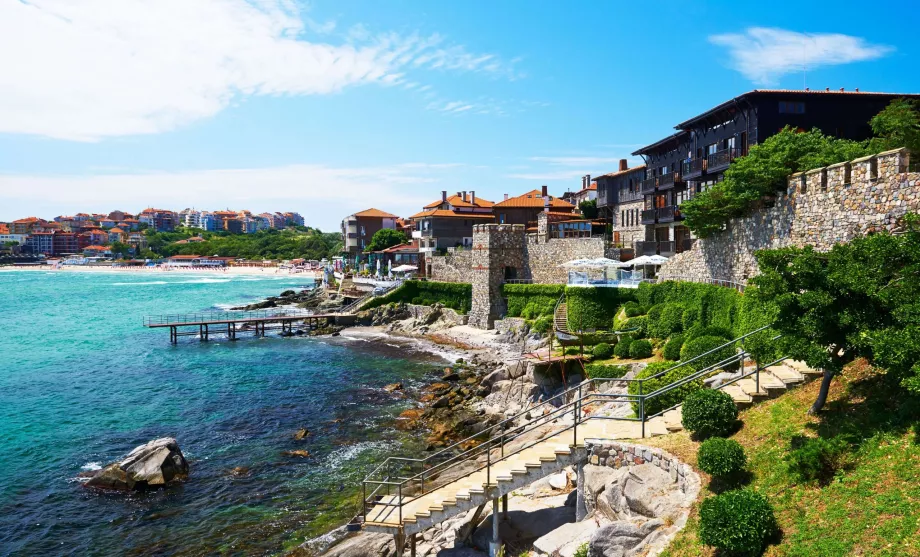Weather in Bulgaria and best time to go

Bulgaria is located in the east of Europe and is thus free from the influence of the warm Atlantic Ocean. Although its shores are bathed by the Black Sea, it has a continental climate - warm summers and cold winters.
However, Bulgaria's more southerly location means that winters are milder and summers warmer than in continental climate areas further north (central Europe, southern Canada, etc.).
The climate is also influenced by the high mountains that fill much of Bulgaria. In the valleys and at higher altitudes it can be up to 15 degrees cooler than in the lowlands and on the coast.
Compare prices for flights to Bulgaria
Weather and temperatures throughout the year
Here's how the weather in Bulgaria looks in each month of the year.
Weather in January
January is the coldest month in Bulgaria with temperatures around 0°C in Sofia and the mountain valleys, and around 5°C by the sea.
Snow is common in the mountains and it usually freezes above 1,000 metres above sea level.
It snows or rains on average 10 days a month, but precipitation is usually not heavy.
Where to go in January?
- Mountains (skiing)
- Sights in the cities
Weather in February
February is a cold winter month with frequent cloudy weather with snow showers in the mountains and light rain in the lowlands or by the sea.
Temperatures are around 2 °C in the east and around 6 °C by the sea. There is regular frost and snow in the mountains.
Where to go in February?
- Mountains (skiing)
- Sights in the cities
Weather in March
During March, it warms up slightly, but temperatures are still low, averaging around 8°C. It is slightly warmer by the sea (about 10 °C).
Although it rains relatively often in March, it is usually only very light showers. It still snows regularly in the mountains above 1 000 metres.
Where to go in March?
- The mountains (skiing), but the snow quality is usually much worse than in January or February
- Sights in the cities
Weather in April
April means soaring temperatures of around 14 to 16°C, making it an ideal time to walk in the cities. Statistically, April/May is when it rains the most, but it is rarely prolonged.
Where to go in April?
- Walking (cities, monasteries, fortresses)
- Sights in the cities
April is not a good month to go to the mountains. Skiing is mostly out of the question, but there can be a lot of snow or mud on hiking trails.
Weather in May
May is a great month for exploring Bulgaria. Temperatures are pleasant and hover around 20°C throughout the country.
Heavy showers often occur in early May, but are replaced by clear or partly cloudy weather.
Where to go in May?
- Walking (cities, monasteries, fortresses)
- Shorter hikes in the mountains (weather can change quickly)
- Sightseeing in towns
Weather in June
During June, the summer season by the sea slowly begins, but be aware that the water is still cold and around 18 to 21°C.
Daytime temperatures across the country are between 22°C and 29°C. In the mountains it is always about 5-6 °C lower.
Rain occurs mainly in the form of short evening or afternoon thunderstorms.
Where to go in June?
- Walking (cities, monasteries, fortresses)
- Hiking in the mountains
- Seaside resorts
Weather in July
Summer in Bulgaria is synonymous with sun and beaches. Temperatures along the coast climb to around 30°C, and in rare cases can reach 38°C, but this is rarely the case. In the mountains, temperatures stay at a pleasant 20 to 23°C.
There is very little rain during July, especially in the form of occasional thunderstorms in the evening or afternoon.
Where to go in July?
- Hiking in the mountains
- Seaside resorts
Weather in August
August is also a warm summer month, with temperatures routinely exceeding 30°C and minimal rain.
The weather is sunny by the sea, but storms can appear unexpectedly in the mountains, but the higher parts of the mountains also have pleasant summer weather.
Where to go in August?
- Hiking in the mountains
- Seaside resorts
Weather in September
September is a good month for off-season trips to the seaside, as prices for tours and hotels are significantly lower than during the holidays.
Temperatures are pleasantly summery, ranging between 23°C and 26°C throughout Bulgaria.
The average number of rainy days is 8, but most of the rain is in the form of showers.
Where to go in September?
- Hiking in the mountains
- Seaside resorts
- Walks (towns, monasteries, fortresses)
Book a hotel with an off-season discount
Weather in October
The sea bathing season is definitely over in October, as air temperatures drop to an average of 15°C to 18°C and the sea is around 19°C.
Even in October, it doesn't rain significantly more than in other months, and on average you'll get rain 8 days a month in the form of showers lasting half a day at most.
Where to go in October?
- Walking (cities, monasteries, fortresses)
- Sights in the cities
- Hikes in the lower parts of the mountains
Weather in November
Autumn is in a similar vein to spring. Temperatures don't start to drop significantly until November, when you can normally expect 10°C to 13°C.
Precipitation in autumn is significantly less than in temperate regions further north in Europe, for example. Rainfall is usually only light, but there may be periods of overcast skies for several days at a time.
- Walks (towns, monasteries, fortresses)
- Sights in the cities
Weather in December
The first month of winter brings snow showers to the mountains, with rain in the lowlands, mostly in the form of light showers.
However, it is often cloudy in December even when it is not raining.
Temperatures drop to between 4 °C and 7 °C and stay around 0 °C at altitudes above 1 000 metres.
- Sights in the cities
- Mountains (skiing), but only towards the end of December when there is a better chance of sufficient snow cover
Table of temperatures during the year
Bulgarian coast - Best for swimming in the sea and sunbathing
Mountains and Sofia - For hiking in cities or hiking in the mountains
When to go to Bulgaria
Of course, it depends on what you expect from your visit, whether you prefer sun, mountains or skiing.
Holidays by the sea
The main season for seaside holidays is June to September.
This is the period when most people visit Bulgaria. Holidays, the second half of June and the first half of September are the ideal months for swimming in the sea, but also walking in the mountains. The weather is stable and warm. Logically, you have to take into account the highest prices for accommodation and services.
The sea is warmest in July, August and early September, when the water temperature is between 23 °C and 26 °C.
Hiking in the mountains
The summer months are also the best for hiking in the mountains. However, the season starts earlier than at the seaside and runs from May to the end of September.
There is no snow in the mountains during this period and snow only covers small areas in the highest parts of the mountains.
April is also good for hiking, but only at lower altitudes, as there is often still plenty of snow above 1,500 metres.
Skiing
Snow is most certain on the slopes in January and February. The highest resorts with around 2,000 metres open in the second half of December and close around mid-March.
Towns and sights
You can visit towns and sights all year round. You can always take shelter from the weather in restaurants, cafés or museums.
July and August are the least convenient times, when the cities are sweltering hot.
If you're not too keen on the cold, avoid December to February.
Any questions left?
If you have any questions or comments about the article...

